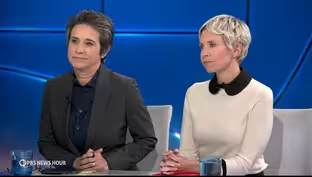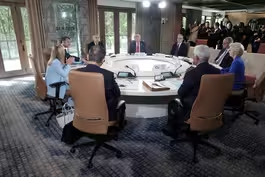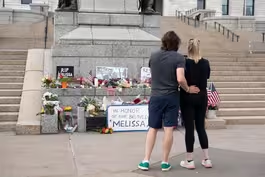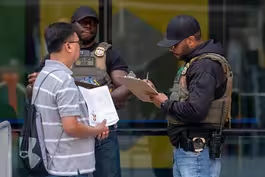
How Israeli strikes have damaged Iran's nuclear capabilities
Clip: 6/16/2025 | 10m 21sVideo has Closed Captions
How Israel's strikes have damaged Iran's nuclear capabilities
Israel warned hundreds of thousands of Tehran residents to evacuate a central district of the Iranian capital Monday, as the assault it began last week continued for a fourth day. Iranian strikes also targeted Tel Aviv and other cities. David Albright, president of the Institute for Science and International Security, joins Amna Nawaz for more on how the fighting impacts Iran's nuclear program.
Problems playing video? | Closed Captioning Feedback
Problems playing video? | Closed Captioning Feedback
Major corporate funding for the PBS News Hour is provided by BDO, BNSF, Consumer Cellular, American Cruise Lines, and Raymond James. Funding for the PBS NewsHour Weekend is provided by...

How Israeli strikes have damaged Iran's nuclear capabilities
Clip: 6/16/2025 | 10m 21sVideo has Closed Captions
Israel warned hundreds of thousands of Tehran residents to evacuate a central district of the Iranian capital Monday, as the assault it began last week continued for a fourth day. Iranian strikes also targeted Tel Aviv and other cities. David Albright, president of the Institute for Science and International Security, joins Amna Nawaz for more on how the fighting impacts Iran's nuclear program.
Problems playing video? | Closed Captioning Feedback
How to Watch PBS News Hour
PBS News Hour is available to stream on pbs.org and the free PBS App, available on iPhone, Apple TV, Android TV, Android smartphones, Amazon Fire TV, Amazon Fire Tablet, Roku, Samsung Smart TV, and Vizio.
Providing Support for PBS.org
Learn Moreabout PBS online sponsorshipAMNA NAWAZ: Welcome to the "News Hour."
Israel warned hundreds of thousands of Tehran residents to evacuate a central district of the Iranian capital today, as the air campaign that began early Friday morning continued for a fourth day.
Iranian strikes also targeted Tel Aviv and other major cities.
To date, 24 Israelis have died from Iranian strikes, and more than 220 Iranians have been killed in the Israeli attacks, which Israel began in a bid to set back Iran's nuclear program.
On Iranian state TV, a broadcaster mid-report on what she calls the sound of aggression against the homeland when... (EXPLOSION) AMNA NAWAZ: ... her Tehran new studio becomes the latest target of Israeli strikes, the headquarters of the Islamic Republic of Iran broadcasting set a blaze in the attack.
The news anchor, Sahar Emami, survived and was quickly back on the air.
The IDF said it conducted a precise strike targeting a communication center that was being used for military purposes by the Iranian armed forces.
Earlier in the day, the Farabi Hospital in the western city of Kermanshah was hit, damaging the intensive care unit.
Iran called it a war crime.
Meanwhile, in Western Tehran, thick plumes of smoke engulfed a residential neighborhood.
Today, the IDF issued an unprecedented evacuation order for a large, densely populated area of Iran's capital city, District 3, known to be a bustling business hub of over a million people.
Across Tehran, streets are deserted, shops locked, and residents are stockpiling essentials, bracing for what comes next.
ZOHREH SHEBELIZADE, Tehran, Iran, Resident (through translator): For now, we just want to leave Tehran for more safety.
That's all, because they said to evacuate Tehran.
And that in itself has created a kind of fear in everyone.
People feel like something really bad might happen in the city.
AMNA NAWAZ: Israel says it's targeting Iranian military infrastructure, including surface-to-air missile launch sites and storage facilities in Central and Western Iran.
But, today, Israeli Prime Minister Benjamin Netanyahu was asked on ABC News about targeting Iran's Supreme Leader Ayatollah Khamenei.
BENJAMIN NETANYAHU, Israeli Prime Minister: It's not going to escalate the conflict.
It's going to end the conflict.
We're preventing the most horrific war imaginable, and we're bringing peace to the Middle East.
AMNA NAWAZ: Israel claims its primary goal is to dismantle Iran's nuclear capabilities, Iran's main enrichment facilities at Natanz and Fordow and nuclear technology center in Isfahan.
Satellite images show damage to the electrical substation that powers the plant and the aboveground pilot fuel enrichment plant at Natanz.
Four buildings have been damaged at Isfahan, but no damage is visible at the Fordow nuclear site, which is buried deep beneath a mountain.
Iran has repeatedly denied developing nuclear weapons and has signed the Nuclear Proliferation Treaty.
But the U.N. nuclear watchdog recently said Iran was flouting an agreement with the agency and hiding some of its nuclear activities.
And after the Israeli strikes, Iran said it will leave the Nuclear Proliferation Treaty altogether.
Israel is presumed to have a sizable nuclear arsenal and is the only Middle East state that has not signed the NPT.
Today, Iranian President Masoud Pezeshkian pledged a harsh response.
MASOUD PEZESHKIAN, Iranian President (through translator): The Iranian nation and its officials will not remain silent in the face of this crime.
The Islamic Republic of Iran's legitimate and powerful response will make the enemy regret its foolish actions.
AMNA NAWAZ: Iran's counterstrikes hit the Israeli port city of Haifa, bombed buildings in the central city of Petah Tikva, and pierced through Israel's air defenses, hitting neighborhoods in Tel Aviv for a third day.
It also damaged a U.S. Embassy building in the city.
And, as tensions rise, President Trump said the Iranians have reached out for talks to de-escalate.
For a perspective on how much damage Israel has inflicted on Iran's nuclear program, we turn now to David Albright.
He's the founder and president of the Institute for Science and International Security.
That's a nonprofit that focuses on educating the public about science and international security policy issues.
He's also the co-author of the book "Iran's Perilous Pursuit of Nuclear Weapons."
David Albright, welcome back to the "News Hour."
Thanks for joining us.
DAVID ALBRIGHT, President, Institute for Science and International Security: No, happy to be here.
AMNA NAWAZ: So I want to ask you about two of those key sites we just reported on, Natanz and Fordow.
How critical are they to Iran's nuclear program and how badly damaged are they?
Do we know?
DAVID ALBRIGHT: Both are critical.
I mean, the Natanz site, it's principally an underground site with about 15,000 centrifuges in it.
And that's sort of the workhorse of the enrichment program.
It produces the 5 percent enriched uranium, which is really, if you're going to go to weapon-grade uranium, that's 70 percent of the effort.
So it's a very important part of it.
Fordow is a deeply buried site.
It was designed as part of the nuclear weapons program in order to take the 5 percent enriched uranium that was produced in Natanz and turn it into weapon-grade uranium.
And so it has a very -- much smaller number of centrifuges, no more than about 3,000, compared to 15,000 at Natanz.
AMNA NAWAZ: And from what we have seen in images, what you have been able to see, can you tell how badly damaged those two sites are?
DAVID ALBRIGHT: Fordow doesn't look damaged at all.
It looks, for some reason, which is perplexing, Israel has not attacked the Fordow site.
It could do quite a bit of damage.
And you see what it can do when you look at the damage done at the Natanz facility.
They targeted the electrical supply, the emergency electrical supply and backup electrical supply.
And that meant that the centrifuges could no longer run.
And if centrifuges aren't run and they start to slow down, they can break.
And so the assessment is that many centrifuges inside the underground facility have broken.
Israel also decided to destroy the aboveground pilot enrichment plant that had about 1,700 centrifuges in it and was making 60 percent enriched uranium.
And so Natanz is inoperative.
AMNA NAWAZ: And there was another site we reported on at Isfahan, where the Iranians convert uranium into metal.
How important is that to the program and what do we know about what kind of damage has been inflicted there?
DAVID ALBRIGHT: Yes, Isfahan is a uranium -- it's called a uranium conversion facility that processes, let's say, originally natural uranium into the gas, a material, a compound that can be turned into a gas and enriched in an enrichment plant.
It's called uranium hexafluoride.
And so it's an extremely important part.
I mean, you can't enrich without a conversion facility.
Over the years, Iran has added capabilities to that site, and one of which was to start making uranium metal.
And that's caused a lot of concern because metal is the form of uranium you use in a nuclear weapon.
AMNA NAWAZ: Now, given the amount of enriched uranium that's at some of these sites that Israel's been targeting, how dangerous is that for the Iranian population?
What's the risk of contamination here?
DAVID ALBRIGHT: The amounts of uranium are relatively small, and it doesn't transport easily.
So, if -- let's -- for example, if the enrichment plant underground was destroyed, it's a geological repository, essentially.
It's not very deeply buried, but still uranium isn't going to get out very easily.
It has to get out through groundwater, and uranium doesn't transport easily.
At Isfahan, there's many -- there's much larger quantities of uranium, but those are not being targeted by Israel.
They're going after these specialized facilities that are linked to the process of building the nuclear weapon itself or trying to destroy existing stocks of enriched uranium, the 20 percent, the 60 percent, even some of the 5 percent.
They want to destroy because, in a sense, it's Iran's investment into making weapon-grade uranium.
AMNA NAWAZ: David, there was an intelligence agency assessment that Iran had been shortening its time frame to build a nuclear weapon.
How have these Israeli attacks changed that timeline, if at all?
DAVID ALBRIGHT: I think the strikes have lengthened the timeline to build the bomb.
I think Iran is inhibited from actually doing that, because they could get caught.
They could reveal assets that they're trying to hide that are needed to build nuclear weapons.
I think, in the short term, they have really stopped the program cold and started to break up or destroy key parts of it, the parts that you need in order to build the bomb itself.
And so I think, on the weaponization side, they're lengthening the time frame to build the bomb and undoing the progress Iran had been making.
On the weapon-grade uranium side, they really haven't finished the job at all.
They have not destroyed Fordow or even made it inoperative.
AMNA NAWAZ: So if the Israelis' stated goal here is to prevent Iran from getting a nuclear weapon, how long do you think these strikes will continue?
And what do you think is Israel's metric for when it's done, how to end these strikes?
DAVID ALBRIGHT: They will not convey a metric, but I would say that probably what Israel's focusing on is on the weaponization side and trying to find the hidden assets that the IAEA has talked about openly in its reports and then -- and destroy those.
And, unfortunately, that also has included going after some of the nuclear scientists.
And I think I think it's a process that doesn't work in the long run because people will come up from the junior ranks or less senior ranks and replace them.
But, in the short run, it's incredibly disruptive.
AMNA NAWAZ: All right, David Albright with the Institute for Science and International Security, thank you so much for joining us.
Really appreciate your time.
DAVID ALBRIGHT: Thank you.
Amy Walter and Leigh Ann Caldwell on political violence
Video has Closed Captions
Clip: 6/16/2025 | 8m 20s | Amy Walter and Leigh Ann Caldwell on the rise in political violence (8m 20s)
A Brief But Spectacular take on caring for LGBTQ seniors
Video has Closed Captions
Clip: 6/16/2025 | 4m 8s | A Brief But Spectacular take on caring for LGBTQ seniors (4m 8s)
Colum McCann's novel explores isolation in the internet age
Video has Closed Captions
Clip: 6/16/2025 | 7m 35s | Author Colum McCann's novel 'Twist' explores isolation in the internet age (7m 35s)
News Wrap: U.S. and U.K. reach trade deal that cuts tariffs
Video has Closed Captions
Clip: 6/16/2025 | 6m 12s | News Wrap: U.S. and U.K. reach trade deal that cuts tariffs (6m 12s)
Republican colleague remembers murdered Minnesota lawmaker
Video has Closed Captions
Clip: 6/16/2025 | 9m 23s | Republican colleague remembers murdered Minnesota lawmaker (9m 23s)
Trump administration pauses some immigration raids
Video has Closed Captions
Clip: 6/16/2025 | 6m 37s | Trump administration pauses immigration raids on farms, hotels and restaurants (6m 37s)
Providing Support for PBS.org
Learn Moreabout PBS online sponsorshipSupport for PBS provided by:
Major corporate funding for the PBS News Hour is provided by BDO, BNSF, Consumer Cellular, American Cruise Lines, and Raymond James. Funding for the PBS NewsHour Weekend is provided by...

















